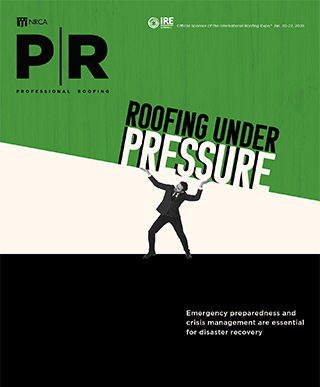NRCA continues to hear from members that one of the most difficult challenges they face is finding and keeping quality workers. NRCA is working on a number of strategies and programs to address this need, one of which is supporting legislation to improve federal policy with respect to career and technical education (CTE). Congress is working to address CTE policy and may approve legislation this year.
How CTE can help
NRCA believes effective CTE programs (sometimes referred to as vocational education) are vital to the roofing industry's long-term prosperity. In recent years, it has become increasingly difficult for contractors to find workers for job openings despite vigorous recruitment efforts. It is expected this problem will become more acute as the construction economy continues to grow. The shortage of qualified workers is a result of an aging workforce, educational trends that encourage greater numbers of students to pursue four-year college degrees and the physically demanding nature of roofing work.
In NRCA's view, CTE programs should help meet the growing need for skilled applicants to fill well-paying roofing industry jobs. NRCA members provide great opportunities for workers to obtain fulfilling careers if they have the requisite skills and work ethic. Entry-level wages are significantly above the minimum wage, and the Bureau of Labor Statistics reports the mean hourly wage for roofing workers throughout the U.S. was $19.04 in 2014. Moreover, there are numerous opportunities for employee advancement to foreman, estimator and other positions within the industry. Roofing companies provide rewarding lifelong careers for those with the proper training and skills and a drive to succeed.
NRCA believes it is important to provide new opportunities for contractors to collaborate with CTE educators and programs to achieve the industry's workforce objectives.
The Perkins act
Congress is considering reauthorizing the Carl D. Perkins Career and Technical Education Act of 2006. This law authorizes an array of programs and funding that involves developing career and technical skills among secondary and postsecondary students who elect to enroll in such programs.
The largest program authorized by the Perkins act is Basic State Grants, which provides formula grants to states for the purpose of developing and implementing CTE programs, services and activities. Programs of study that receive federal funding must incorporate secondary and postsecondary education elements into a coordinated progression of courses leading to an industry-recognized credential, certificate or degree. The law also authorizes additional programs designed to meet specific CTE needs identified by state and local governments. Perkins act programs are funded at just more than $1 billion per year by the federal government.
NRCA believes legislation to reauthorize the Perkins act should include innovative reforms that produce better opportunities for high school and postsecondary students to access CTE programs and gain the skills needed to succeed in the roofing industry. Any reauthorization of the Perkins act should strengthen the role of employers in the development and implementation of CTE programs. The legislation also should provide maximum flexibility in the design of CTE programs to ensure they effectively meet changing economic demands.
In particular, NRCA wants to see a greater role for employer-sponsored internships and on-the-job training in CTE programs, as well as new partnerships among employers and CTE institutions. Finally, the reauthorized Perkins act should provide more incentives for the development of industry-recognized credentials, which NRCA views as a key component of future efforts to encourage greater interest in roofing industry careers.
NRCA will continue working with lawmakers in Congress to develop legislation that strengthens and improves CTE programs, ultimately making such programs more responsive to the workforce development needs of the roofing industry. Despite the partisan gridlock in Congress, there is significant bipartisan support of this issue, so passage of legislation to improve CTE programs is possible this year.
Duane L. Musser is NRCA's vice president of government relations.



